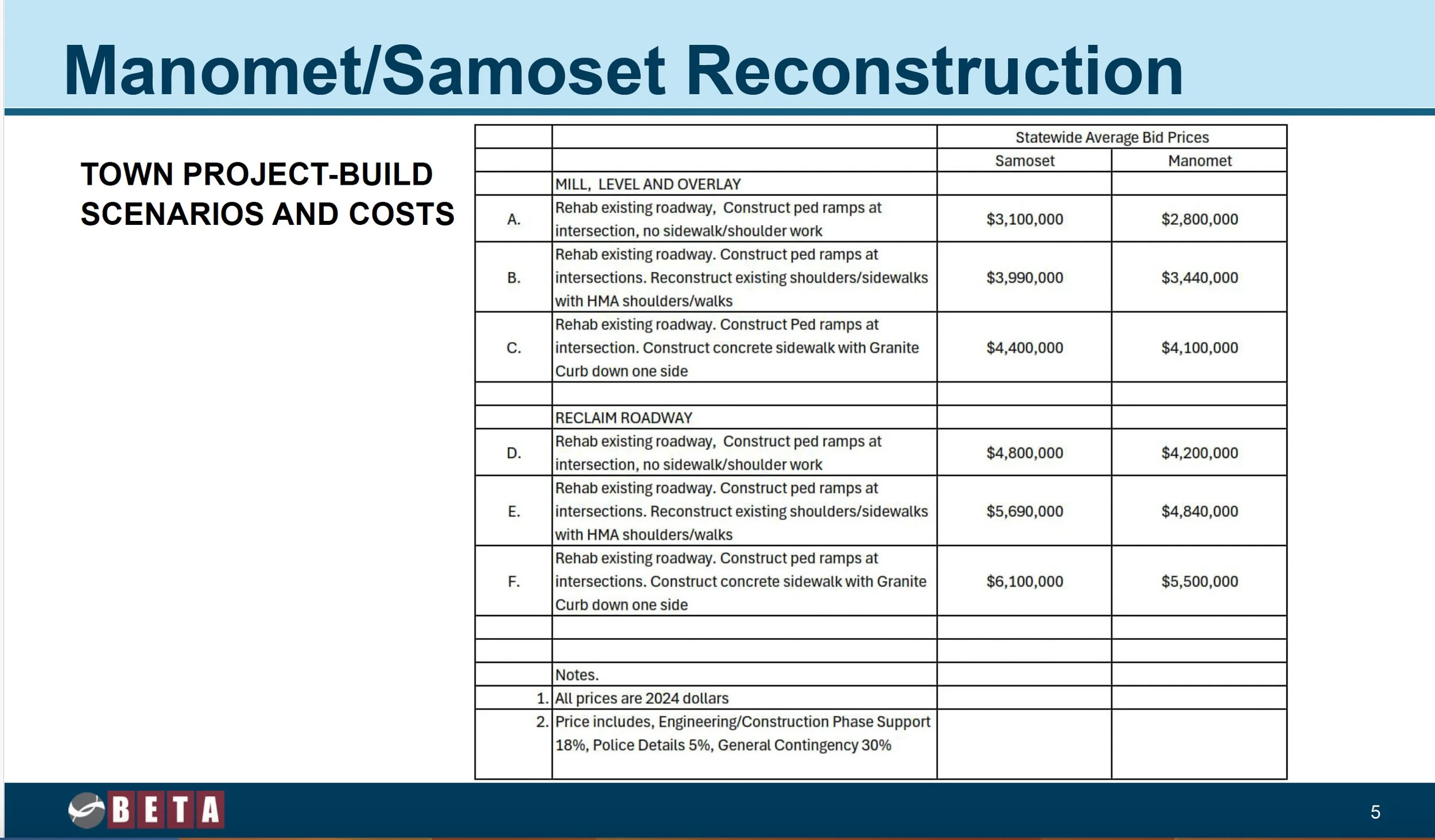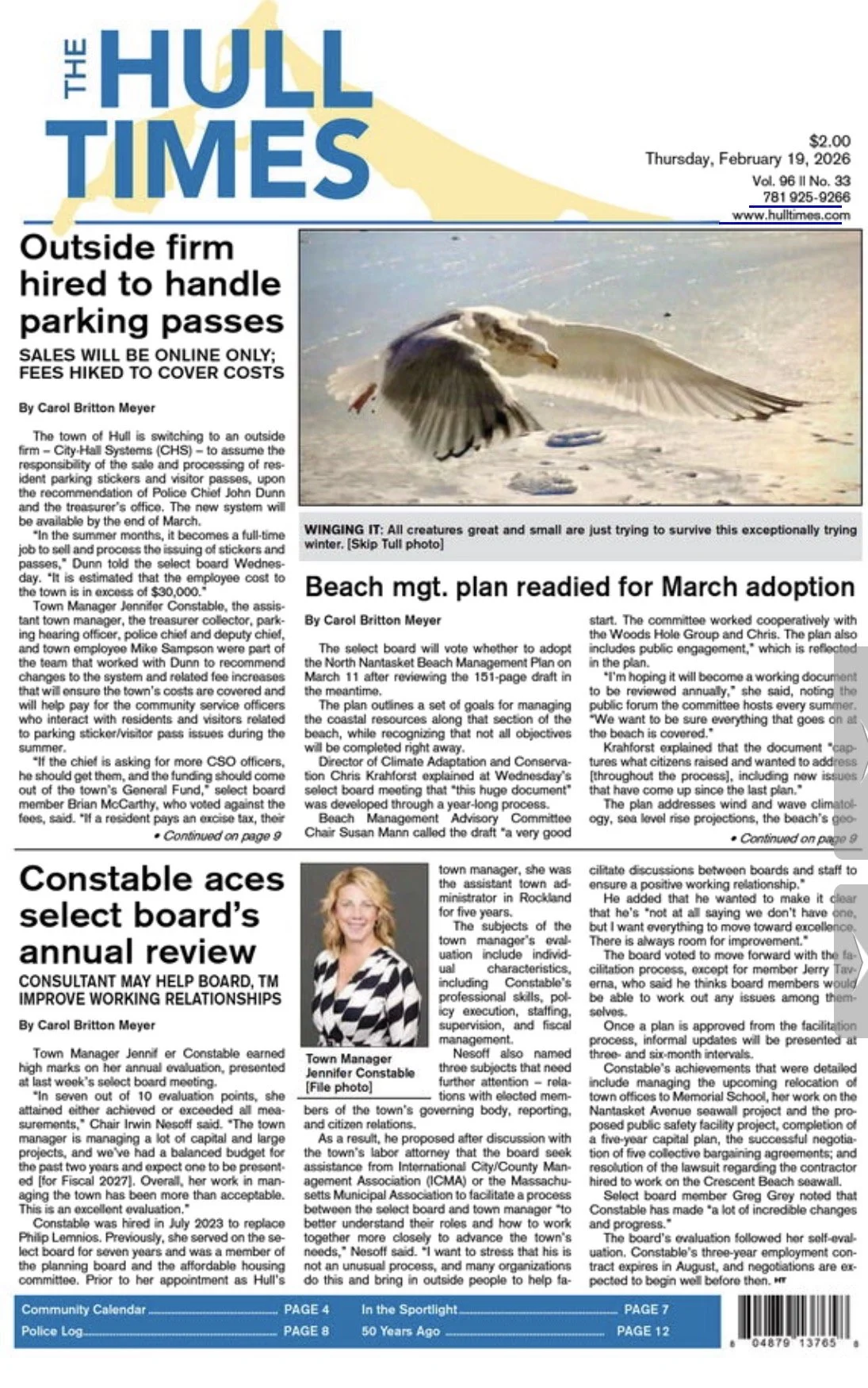Samoset/Manomet repaving project could bring changes to parking and traffic flow
/By Carol Britton Meyer
There are two scenarios for the long-awaited Manomet/Samoset Avenue reconstruction – funded entirely by the town or through the Massachusetts Department of Transportation’s Transportation Improvement Program (TIP), contingent on approval of the project – and each option could result in changes in traffic flow, pedestrian access, and parking.
With the second option, the state would pay for most of the cost, with the town responsible for funding the design – at an estimated $1.5 to $2 million – and as yet unknown right-of-way expenses. Each road is about a mile long.
Town Manager Jennifer Constable noted during Wednesday’s select board meeting that the board heard a presentation about potential options a few months ago and that this latest update was a “refresher” prior to the planned public meeting about the project. Details on this session are to be announced.
Director of Wastewater Operations/Assistant Director of Public Works John Struzziery and Merrick Turner, representing the BETA Group, Inc. – an engineering, planning, and construction services company – provided updates to the board.
A town project would be simpler, involving minimal leveling and overlay work in addition to providing accessibility at intersections, with an option to add sidewalks, bike lanes, and more extensive rehabilitation of the roads.
The timeframe for completion would be shorter, taking about two to three years.
TIP option more comprehensive
A TIP project would be designed in accordance with MassDOT policy, with sidewalks on both sides, and accommodations for bicycles.
This would be a more comprehensive, complex way to do the project, taking potentially from seven to 10 years to complete from start to finish, according to the presentation.
In preparation, traffic counts and parking scenarios were taken and considered during Thursday through Sunday, July 11 through 14, in 2024 (through August 21 for parking).
The report indicates low volumes and speeds, with a one-way road as a viable option for traffic flow.
Various cost estimates were also presented in 2024 dollars for various construction scenarios involving different levels of reconstruction – ranging from $3.1 to $6.1 million for Samoset and $2.8 to $5.5 million for Manomet.
Several strategies also were presented for both roads. For Samoset, they ranged from retaining a two-way road with parking on one or both sides to one-way travel with parking on both sides.
For Manomet, options included both a two-way road that meets MassDOT criteria that would eliminate parking and include a bike lane on both sides and one-way travel with parking on both sides (except from A Street to Lewis Street), and a one-way bike lane scenario.
There are a number of different options for parking, which will be discussed at the public meeting.
MassDOT considers project ‘very viable’
While the TIP process is competitive, Struzziery said that input from MassDOT indicates that “the project is very viable and we can make [our submission for the grant funding] competitive.”
The expected lifetime of a town-funded project would be about 10-20 years, while with a more comprehensive MassDOT project, the expected lifetime would be 20-plus years, according to Turner.
Select board member Jerry Taverna expressed some concerns about residents’ reactions.
“I think we [could] have a big problem with residents. We’re talking about major changes,” he said. “We’ve taken a year to study this, and I think some serious public outreach has to happen, and education about the project – to take some time to hold multiple meetings with feedback from the residents that would be affected.”
Struzziery agreed, noting that MassDOT is looking for community support for the project as part of the process.
Following public input, the town would need to submit a TIP application for the project to move forward with applying for state funding.
In other business
The select board unanimously supported the submission of seven Community Preservation Act applications by various entities involving town-owned properties – a requirement to apply for CPA funding through the Community Preservation Committee – for the next round. The pre-application deadline is September 30.
The funding requests include:
• A patio to be installed at the front of the senior center to provide outdoor seating and additional space for social gatherings;
• Restoration of historic records in the Hull Village Fire Station;
• Cleanup of parts of Fort Revere;
• Fencing at the Hull Community Garden on George Washington Boulevard;
* Stencil signage to indicate public access at a number of town-owned waterfront locations, resulting from the Waterfront Access Working Group’s ongoing study;
• The Village playground and basketball courts;
• The Hull Community Housing Trust Fund – 10% or more of the town’s CPA yearly funding resulting from an earlier voter-approved tax surcharge is set aside for affordable housing purposes.
The CPC reviews all applications and makes recommendations to town meeting, where voters have the final say.
Like what you’re reading? Stay informed and support our work with a Hull Times subscription by clicking here.
Do you have an opinion to share? Click here to write a Letter to the Editor.
© 2025 The Hull Times. All rights reserved.












